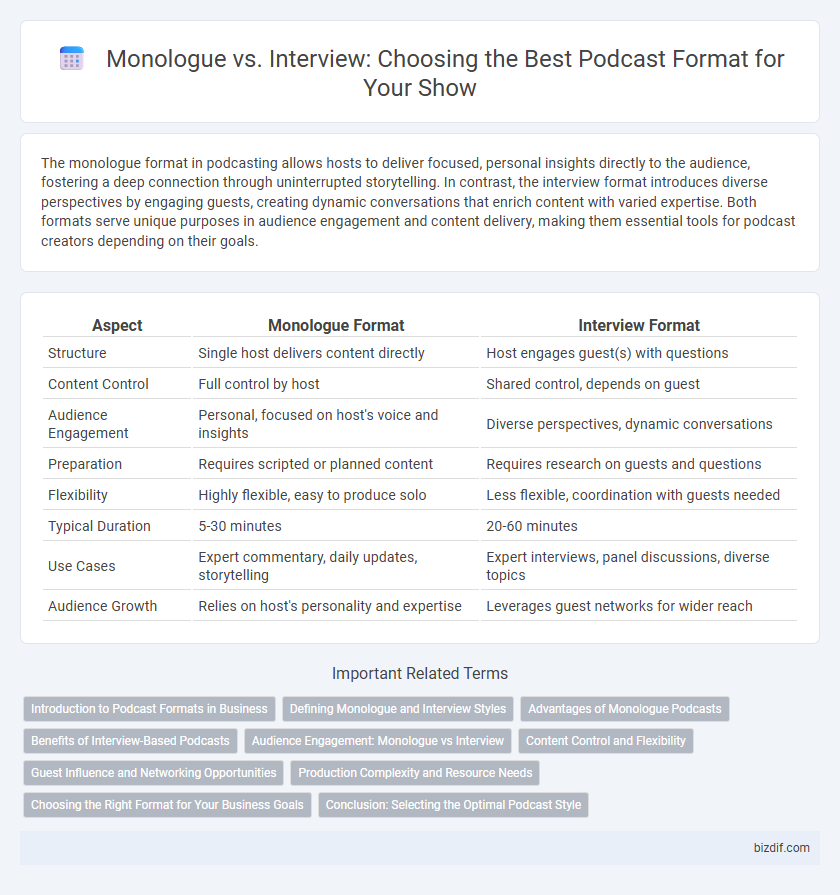The monologue format in podcasting allows hosts to deliver focused, personal insights directly to the audience, fostering a deep connection through uninterrupted storytelling. In contrast, the interview format introduces diverse perspectives by engaging guests, creating dynamic conversations that enrich content with varied expertise. Both formats serve unique purposes in audience engagement and content delivery, making them essential tools for podcast creators depending on their goals.
Table of Comparison
| Aspect | Monologue Format | Interview Format |
|---|---|---|
| Structure | Single host delivers content directly | Host engages guest(s) with questions |
| Content Control | Full control by host | Shared control, depends on guest |
| Audience Engagement | Personal, focused on host's voice and insights | Diverse perspectives, dynamic conversations |
| Preparation | Requires scripted or planned content | Requires research on guests and questions |
| Flexibility | Highly flexible, easy to produce solo | Less flexible, coordination with guests needed |
| Typical Duration | 5-30 minutes | 20-60 minutes |
| Use Cases | Expert commentary, daily updates, storytelling | Expert interviews, panel discussions, diverse topics |
| Audience Growth | Relies on host's personality and expertise | Leverages guest networks for wider reach |
Introduction to Podcast Formats in Business
Monologue podcast format offers businesses a direct channel to deliver expert insights, establish thought leadership, and maintain consistent branding through a single host's perspective. Interview format provides dynamic content by featuring industry leaders, clients, or partners, fostering diverse viewpoints and building credibility through authentic conversations. Both formats strategically enhance audience engagement and brand authority in the business podcasting landscape.
Defining Monologue and Interview Styles
Monologue podcasting features a single host delivering content directly to the audience, emphasizing personal insights and uninterrupted storytelling. Interview podcasting involves a host engaging with one or more guests, creating dynamic, conversational exchanges that explore diverse perspectives. Both formats shape listener experience through either focused narrative or interactive dialogue, influencing content depth and engagement.
Advantages of Monologue Podcasts
Monologue podcasts offer creators full control over content, enabling a focused and consistent message that builds a strong personal brand and loyal audience. They allow for deep expertise demonstration and uninterrupted storytelling, enhancing listener engagement through an intimate and authentic connection. The simplicity of production and scheduling makes monologue formats cost-effective and efficient, ideal for solo podcasters aiming for clarity and direct communication.
Benefits of Interview-Based Podcasts
Interview-based podcasts foster dynamic conversations that provide diverse perspectives and expert insights, enhancing listener engagement and knowledge retention. This format encourages authentic storytelling and spontaneous dialogue, creating a more relatable and interactive experience compared to monologues. By featuring varied guest voices, interview podcasts expand audience reach and build credibility within niche communities.
Audience Engagement: Monologue vs Interview
Monologue podcasts create a direct, intimate connection by allowing hosts to share personal insights and storytelling, fostering deep audience engagement through focused content. Interview formats engage listeners by introducing diverse perspectives and dynamic conversations, which stimulate curiosity and maintain interest. Audience interaction tends to be higher in interviews due to varied voices and spontaneous dialogue, enhancing listener retention and participation.
Content Control and Flexibility
Monologue podcast formats offer complete content control and flexibility, allowing hosts to tailor episodes precisely to their vision without external input. In contrast, interview formats require adapting to guests' perspectives, which can introduce varied insights but limit direct control over the conversation flow. This dynamic impacts the consistency and spontaneity of the podcast's messaging and pacing.
Guest Influence and Networking Opportunities
Monologue podcast formats limit guest influence by centering content solely on the host's insights, which restricts diverse perspectives and networking growth. Interview formats enhance guest influence by featuring expert voices, fostering dynamic discussions, and expanding the host's professional network through meaningful collaborations. The interactive nature of interviews facilitates relationship-building and community engagement critical for podcast growth and influence in the industry.
Production Complexity and Resource Needs
Monologue podcast formats require minimal production complexity and fewer resources, often involving a single host recording with basic equipment and minimal editing. Interview formats demand increased production effort, including scheduling guests, managing remote or in-person recordings, and extensive post-production editing to ensure smooth guest-host interactions. The resource needs for interviews typically involve multiple microphones, sound engineering support, and coordination tools, making them more resource-intensive than monologue podcasts.
Choosing the Right Format for Your Business Goals
Monologue podcast formats offer a focused platform to establish authority and deliver targeted insights directly to your audience, ideal for businesses aiming to build a personal brand or showcase expertise without distractions. Interview formats provide diverse perspectives and networking opportunities, enhancing audience engagement and broadening reach by leveraging guest credibility aligned with business objectives. Selecting the right podcast format depends on your strategic goals--choose monologues for consistent messaging and interviews to foster community interaction and industry connections.
Conclusion: Selecting the Optimal Podcast Style
Choosing between monologue and interview podcast formats depends on your content goals and audience engagement preferences. Monologues offer focused, uninterrupted storytelling and personal insights, ideal for deep dives or expert perspectives. Interviews provide dynamic, conversational content that fosters diverse viewpoints and listener interaction, making them optimal for exploring multiple angles on a topic.
Monologue format vs Interview format Infographic

 bizdif.com
bizdif.com